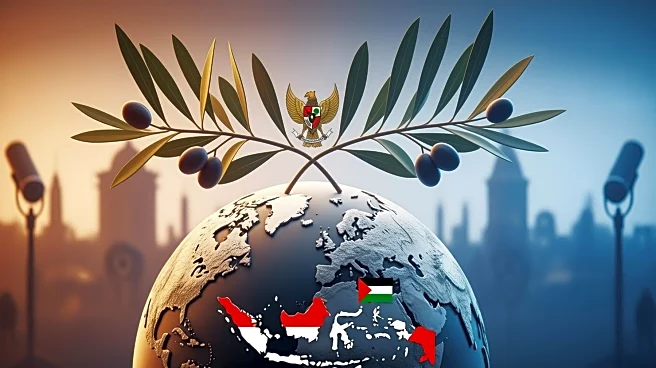What's Happening?
Indonesia, the world's largest Muslim-majority nation, is aiming to play a more active role in the Gaza peace process. President Prabowo Subianto, who recently attended a peace summit in Egypt alongside
President Trump, is pushing for Indonesia to send its largest deployment of peacekeepers to Gaza. The Indonesian government is prepared to maintain a long-term aid presence in the region, with aid already stationed in Jordan ready to enter Gaza. This move is part of Prabowo's broader strategy to assert Indonesia's influence on the global stage, diverging from the country's traditionally insular foreign policy. Indonesia has historically supported Palestinian statehood and does not formally recognize Israel.
Why It's Important?
Indonesia's involvement in the Gaza peace process could shift dynamics in the region, offering a neutral perspective compared to other Middle Eastern countries. This initiative may enhance Indonesia's international standing and influence, particularly in the Muslim world. However, the move also poses challenges, as Indonesia must navigate sensitive domestic opinions regarding Palestine and Israel. The potential deployment of peacekeepers and aid could bolster humanitarian efforts in Gaza, but questions remain about Indonesia's capacity to fulfill its ambitious pledges.
What's Next?
Indonesia is discussing the logistics of deploying peacekeepers, with its military on standby. The country is also exploring ways to contribute to the reconstruction of Gaza's infrastructure, including schools and hospitals. However, the lack of formal recognition of Israel complicates Indonesia's ability to play a peacekeeping role. The Indonesian government must balance domestic public opinion with its international ambitions, as President Prabowo's actions may spark debate within Indonesia.
Beyond the Headlines
Indonesia's increased involvement in Gaza reflects broader geopolitical shifts, as countries outside the traditional Arab-Western axis seek to influence Middle Eastern affairs. This development highlights the growing importance of non-traditional actors in global diplomacy and peacekeeping efforts. Indonesia's actions may inspire other nations to reconsider their roles in international conflicts, potentially leading to more diverse and inclusive peace processes.










